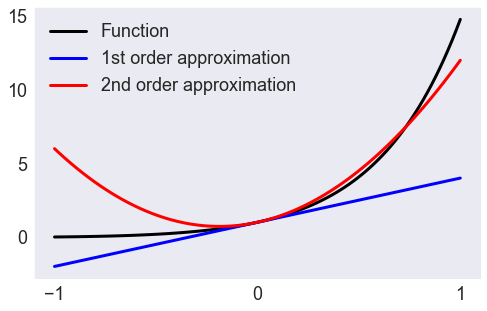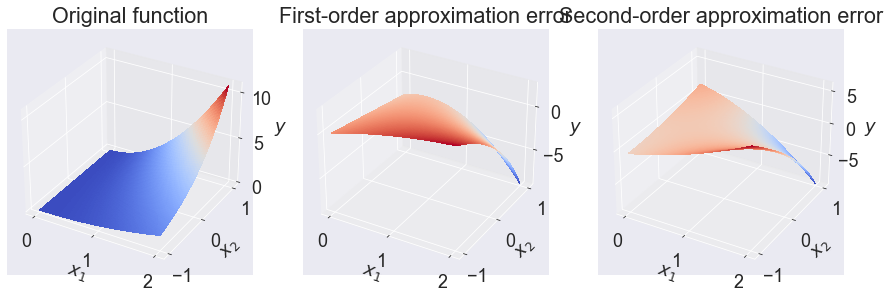Taylor Approximations
Contents
Taylor Approximations¶
Randall Romero Aguilar, PhD
This demo is based on the original Matlab demo accompanying the Computational Economics and Finance 2001 textbook by Mario Miranda and Paul Fackler.
Original (Matlab) CompEcon file: demmath01.m
Running this file requires the Python version of CompEcon. This can be installed with pip by running
!pip install compecon --upgrade
Last updated: 2021-Oct-01
import numpy as np
import matplotlib.pyplot as plt
from compecon.tools import nodeunif
from matplotlib import cm
Univariate Taylor approximation¶
For the function $\(f(x) = (x+1)\exp(2x) \)$
the first-order Taylor approximation is $\(\hat{f}(x) = 1+3x \)$
and the second-order approximation is $\(\hat{f}(x) = 1+3x + 8x^2 \)$
x = np.linspace(-1, 1, 100)
y = (x + 1) * np.exp(2 * x)
y1 = 1 + 3 * x
y2 = 1 + 3 * x + 8 * x ** 2
plt.figure(figsize=[8, 5])
plt.plot(x, y, 'k', linewidth=3, label='Function')
plt.plot(x, y1, 'b', linewidth=3, label='1st order approximation')
plt.plot(x, y2, 'r', linewidth=3, label='2nd order approximation')
plt.legend()
plt.xticks([-1, 0, 1])
plt.show()

Bivariate Taylor approximation¶
For the function $\(g(x) = x_1^2\exp(-x_2) \)$
the first-order Taylor approximation around \((1,0)\) is $\(\hat{g}(x) = 2x_1 -x_2 - 1\)$
and the second-order approximation is $\(\hat{g}(x) = x_1^2 - 2x_1 x_2 +0.5x_2^2 + x_2\)$
nplot = [101, 101]
a = [0, -1]
b = [2, 1]
x1, x2 = nodeunif(nplot, a, b)
x1.shape = nplot
x2.shape = nplot
y = np.exp(x2) * x1 ** 2
y1 = 2 * x1 - x2 - 1
y2 = x1 ** 2 - 2 * x1 * x2 + 0.5 * x2 ** 2 + x2
def newPlot(title, Y, k):
ax = fig.add_subplot(1, 3, k, projection='3d')
ax.plot_surface(x1, x2, Y, rstride=1, cstride=1, cmap=cm.coolwarm,
linewidth=0, antialiased=False)
ax.set_xlabel('$x_1$')
ax.set_ylabel('$x_2$')
ax.set_zlabel('$y$')
plt.title(title)
fig = plt.figure(figsize=[15, 6])
newPlot('Original function', y, 1)
newPlot('First-order approximation error', y1-y, 2)
newPlot('Second-order approximation error', y2-y, 3)
plt.show()

